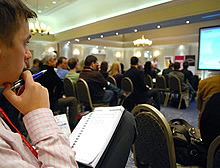
Event Surveys
Events, like seminars, conventions, and tradeshows, are essential activities for many associations, often requiring months of planning and significant expense. It is critical that such events are successful. Surveys can be used make events more relevant to attendees and more successful for the organization and event participants.
Event Planning Survey
Most event surveys are conducted after the event, but instead of evaluating the event after it's over, why not conduct the survey during the event planning stage. Given the time, cost, and importance of some events, an event planning survey could prove a wise investment.
The goals of an event planning survey are to help you maximize attendance and increase satisfaction, thus increasing future attendance. Questions to likely attendees can cover interest/preference for issues and speakers, topics for workshops or seminars, preference for event locations, preferred social/networking opportunities, entertainment options, and more.
Since planning for the “next” event sometimes begins not long after an event concludes, it is possible for an event survey to include both questions to evaluate an event and to plan for the next event.
Post Event Survey
This is the most common type of event survey. Immediately following, or soon after, the event, attendees are asked to complete a questionnaire in which they evaluate each element of the event in which they participated: tradeshow, seminars, workshops, social events, entertainment, etc. They are asked what made the event worthwhile, and what would have made it better. Results are used to evaluate this year's event and to look for ways to improve.
Surveys During an Event
Short surveys, either on paper or online, can be conducted during the event itself. In this situation, the survey is not about the event, it is about the issues or topics that are the subject of the event. For example, at a convention of HR Directors, while they are all together in one place, they could be asked to complete a short survey on an issue or concern they have in common. Results could be segmented by organization size to see how challenges differ based on number of employees. In some situations, it is possible to present the survey results at the conclusion of the event.
